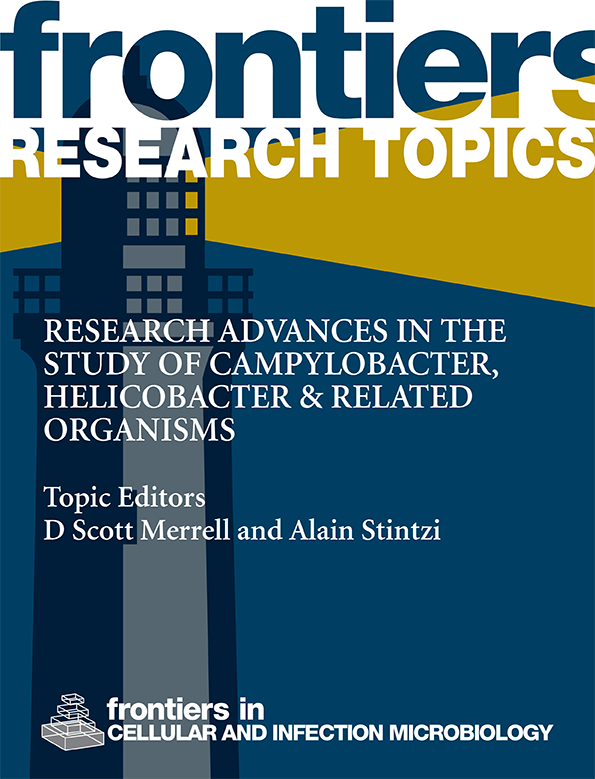幽门螺杆菌感染对中国人急性冠状动脉综合征和脂质代谢的影响
IF 4.6
2区 医学
Q2 IMMUNOLOGY
Frontiers in Cellular and Infection Microbiology
Pub Date : 2024-09-03
DOI:10.3389/fcimb.2024.1437425
引用次数: 0
摘要
背景急性冠状动脉综合征(ACS)患者中幽门螺杆菌(H. pylori)感染率相对较高。以前曾假设幽门螺杆菌通过调节血脂水平诱发 ACS。然而,幽门螺杆菌诱发 ACS 的风险在不同种族群体之间存在显著差异,幽门螺杆菌与血脂参数之间的关联仍不清楚。本研究旨在系统评估中国幽门螺杆菌感染人群的 ACS 风险,同时评估幽门螺杆菌对血脂参数的影响。采用免疫印迹法检测幽门螺杆菌并进行基因分型。通过卡方检验和多元逻辑回归模型分析了幽门螺杆菌与 ACS 以及血脂参数之间的关系。04,95% 置信区间(CI):1.76-9.25,P < 0.05),与毒力因子(细胞毒素相关基因 A(CagA)或空泡毒素基因 A(VacA))无关联。亚组分析显示,56-64 岁感染幽门螺杆菌的老年人群发生 ACS 的风险显著增加。此外,还观察到幽门螺杆菌与急性心肌梗死(AMI)之间有很大的关联。幽门螺杆菌感染阳性和阴性个体之间的血脂参数,包括低密度脂蛋白胆固醇(LDL-C)、甘油三酯(TG)、总胆固醇(TC)、高密度脂蛋白胆固醇(HDL-C)以及 LDL/HDL 比值均无明显差异。结论我们的研究首次证明,幽门螺杆菌不会对脂质代谢产生显著影响,但会将中国人群罹患 ACS 的风险增加四倍(OR = 4.04,95% CI:1.76-9.25)。此外,幽门螺杆菌的毒力因子(CagA 和 VacA)可能与促进 ACS 发生的机制无关。这一发现为幽门螺杆菌与不同种族群体的 ACS 之间的关联提供了更多证据,并驳斥了幽门螺杆菌通过调节脂质代谢影响 ACS 的生物学机制。对老年人和 ACS 高危人群定期进行幽门螺杆菌筛查和根除治疗可能是降低 ACS 发病率的有效措施。未来的研究应包括多中心随机对照试验,并探索宿主遗传学和幽门螺杆菌对肠道微生物群的影响,将其作为连接幽门螺杆菌和 ACS 的潜在生物学途径。本文章由计算机程序翻译,如有差异,请以英文原文为准。
The influence of Helicobacter pylori infection on acute coronary syndrome and lipid metabolism in the Chinese ethnicity
BackgroundAcute coronary syndrome (ACS) patients frequently present a relatively high prevalence of Helicobacter pylori (H. pylori ) infection. H. pylori was previously hypothesized to induce ACS through the regulation of lipid levels. However, the risk of H. pylori -induced ACS varies significantly among different ethnic groups, and the associations between H. pylori and lipid parameters remain unclear. This study aimed to systematically assess the risk of ACS in Chinese populations with H. pylori infection while also evaluating the effects of H. pylori on lipid parameters.Materials and methodsA hospital-based case−control study involving 280 participants was conducted. Immunoblotting was used for the detection and genotyping of H. pylori . The associations between H. pylori and ACS, as well as lipid parameters, were analyzed via the chi-square test and a multiple logistic regression model.ResultsH. pylori infection significantly increased the risk of ACS among all participants (adjusted odds ratio (OR) = 4.04, 95% confidence interval (CI): 1.76−9.25, P < 0.05), with no associations with virulence factors (cytotoxin-associated gene A (CagA ) or vacuole toxin geneA (VacA )). Subgroup analysis revealed a significant increase in the risk of ACS among the elderly population aged 56−64 years with H. pylori infection. Additionally, a substantial association was observed between H. pylori and acute myocardial infarction (AMI). No significant differences were found in lipid parameters, including low-density lipoprotein cholesterol (LDL-C), triglyceride (TG), total cholesterol (TC), high-density lipoprotein cholesterol (HDL-C), and the LDL/HDL ratio, between individuals positive and negative for H. pylori infection. Similar results were observed between the ACS group and the control group.ConclusionsOur study has demonstrated for the first time that H. pylori does not significantly impact lipid metabolism but increases the risk of ACS fourfold in the Chinese population (OR = 4.04, 95% CI: 1.76−9.25). Furthermore, the virulence factors of H. pylori (CagA and VacA ) may not be involved in the mechanisms by which they promote the development of ACS. This finding provides additional evidence for the association between H. pylori and ACS among different ethnic groups and refutes the biological mechanism by which H. pylori affects ACS through lipid metabolism regulation. Regular screening for H. pylori and eradication treatment in elderly individuals and those at high risk for ACS may be effective measures for reducing the incidence of ACS. Future research should include multicenter randomized controlled trials and explore host genetics and the effects of H. pylori on the gut microbiota as potential biological pathways linking H. pylori and ACS.
求助全文
通过发布文献求助,成功后即可免费获取论文全文。
去求助
来源期刊

Frontiers in Cellular and Infection Microbiology
IMMUNOLOGY-MICROBIOLOGY
CiteScore
7.90
自引率
7.00%
发文量
1817
审稿时长
14 weeks
期刊介绍:
Frontiers in Cellular and Infection Microbiology is a leading specialty journal, publishing rigorously peer-reviewed research across all pathogenic microorganisms and their interaction with their hosts. Chief Editor Yousef Abu Kwaik, University of Louisville is supported by an outstanding Editorial Board of international experts. This multidisciplinary open-access journal is at the forefront of disseminating and communicating scientific knowledge and impactful discoveries to researchers, academics, clinicians and the public worldwide.
Frontiers in Cellular and Infection Microbiology includes research on bacteria, fungi, parasites, viruses, endosymbionts, prions and all microbial pathogens as well as the microbiota and its effect on health and disease in various hosts. The research approaches include molecular microbiology, cellular microbiology, gene regulation, proteomics, signal transduction, pathogenic evolution, genomics, structural biology, and virulence factors as well as model hosts. Areas of research to counteract infectious agents by the host include the host innate and adaptive immune responses as well as metabolic restrictions to various pathogenic microorganisms, vaccine design and development against various pathogenic microorganisms, and the mechanisms of antibiotic resistance and its countermeasures.
 求助内容:
求助内容: 应助结果提醒方式:
应助结果提醒方式:


